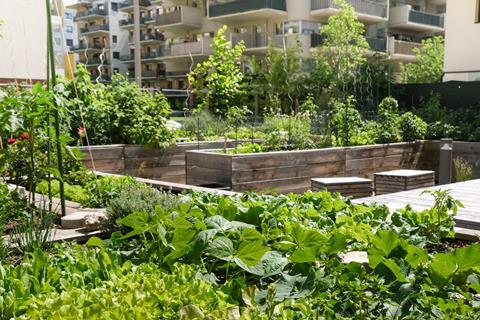Coronation Gardens for Food and Nature project outlines multiple benefits of local food production
A new report has called on local councils to raise their ambition for community food growing after finding significant benefits for community wellbeing, nature restoration and local economies.

The Coronation Gardens for Food and Nature project – which is a partnership between The Wildlife Trusts, the WI, Incredible Edible, and Garden Organic, funded by The National Lottery Fund – has supported local community food initiatives to grow sustainable and nature-friendly food across the UK, including in London, Nottingham and Hull.
The independent report shows that community food growing boosts local economies and provides opportunities to access natural spaces, improves people’s physical health through them spending time in nature, and can make a huge difference to mental health and wellbeing as people work together to grow food in their local area.
The findings add to wider research into the benefits of access to green space, and the positive effects that community work and volunteering can have on health and wellbeing, the project pointed out.
The Coronation Gardens for Food and Nature project is now urging local government to adopt the principle of a ‘Right to Grow’ across the UK due to the provable benefits for people and wildlife.
Earlier this year, Hull City Council became the first council to adopt a ‘Right to Grow’ policy to enable local citizens to grow their own food in disused areas. The council’s default response to a community’s request to grow food on unused land should now be “yes”, unless there are demonstrable reasons why it is not suitable.
Furthermore, through the ‘Right to Grow’ principle, councils should offer support around management, use and insurance.
Nikki Williams, director of campaigning and communities at The Wildlife Trusts, said: “We know that lasting community change comes directly from the people themselves. Local people want more access to nature and more say in what happens in their own area.
“The ‘Right to Grow’ has the potential to support community food growing efforts across the country, connecting people with nature by their doorstep and boosting local economy and health outcomes.
“With more and more of us becoming disconnected from the food we eat and nature that surrounds us, this report proves that we need to see more local councils following Hull’s lead and adopting the ‘Right to Grow’ if we are to all reap the rewards.”
In further recommendations, the report argues that community food growing should be championed within the community-led version of the emerging ‘Neighbourhood Health Service’, a new NHS strategy linking health and healthy lifestyles to communities and the nature on British people’s doorsteps.
It notes that community food growing cuts across different government departments and agendas, including health, environment and food, volunteering, neighbourhood and democratic renewal. It should be prioritised and included across departmental strategies and priorities across England, Scotland and Wales, it adds.
It also points out that volunteers are the key to effective community work, but handle multiple competing pressures while dedicating their time to making tangible improvements in their areas. These should be considered vital roles, and paid for their work, the group argues.
It adds that community food growing should be integrated into Defra’s development of the National Food Strategy to ensure people are connected to the sustainable diets they eat.



